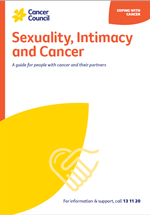- Home
- Prostate cancer
- Managing side effects
- Restoring your sex life
Restoring your sex life
Prostate cancer can affect your sexuality in both physical and emotional ways. The impact of these changes depends on many factors, such as the cancer treatment and its side effects, your general health, whether you are single or in a relationship, how you and your partner communicate, and your level of self-confidence.
It may take some time to adjust to changes in your sex drive and how this affects your self-esteem and sexual relationships.
Learn more about:
Communicating with a new partner
Deciding when to tell a potential sexual partner about your cancer experience isn’t easy, and you may avoid dating for fear of rejection.
While the timing will be different for each person, it can be helpful to wait until you and your new partner have developed a mutual level of trust and caring. You might prefer to talk with a new partner about your concerns before becoming sexually intimate. By communicating openly, you avoid misunderstandings and may find that your partner is more accepting and supportive. For more on this see Sexuality, intimacy and cancer or listen to our podcast episode Sex and Cancer.
Managing changes in your sex life
- Talk about the changes and your feelings about sex. If you have a partner, these changes will probably affect you both. Reassure them that intimacy is still possible and important to you.
- Focus on giving and receiving pleasure in different ways without any expectations of sexual penetration. Other ways of expressing love include touching, holding, caressing and massage.
- Explore the range of adult products (e.g. sex toys like dildos and vibrators). These may help spark your interest in sex or your partner can satisfy themselves, either alone or with you present.
- Take time to get used to any changes. Look at yourself naked in the mirror and touch your genitals to feel any differences or soreness.
- Start slowly – touch each other’s skin, then include genital touching.
- When you feel ready, try intercourse even with a partial erection. This stimulation may encourage better erections.
- Explore your ability to enjoy sex and understand any changes by masturbating.
- Ask your partner to help you reach orgasm through gentle hand-stroking. Use silicone-based lubricants for prolonged stimulation.
- Try different positions to find out what feels comfortable. Having sex while kneeling or standing may also help with erections.
- Use mindfulness techniques to help you stay in the moment with your partner. Listen to our Finding Calm During Cancer podcast for mindfulness exercises.
- Talk to your doctor, a sexual health physician or counsellor if the changes are causing depression or relationship problems.
- Download this booklet on sexual issues after cancer treatment from Prostate Cancer Foundation of Australia or see Sexuality, intimacy and cancer.
Podcast: Sex and Cancer
Listen to more of our podcast for people affected by cancer
More resources
A/Prof Ian Vela, Urologic Oncologist, Princess Alexandra Hospital, Queensland University of Technology, and Urocology, QLD; A/Prof Arun Azad, Medical Oncologist, Urological Cancers, Peter MacCallum Cancer Centre, VIC; A/Prof Nicholas Brook, Consultant Urological Surgeon, Royal Adelaide Hospital and A/Prof Surgery, The University of Adelaide, SA; Peter Greaves, Consumer; Graham Henry, Consumer; Clin Prof Nat Lenzo, Nuclear Physician and Specialist in Internal Medicine, Group Clinical Director, GenesisCare Theranostics, and Notre Dame University Australia, WA; Henry McGregor, Men’s Health Physiotherapist, Adelaide Men’s Health Physio, SA; Jessica Medd, Senior Clinical Psychologist, Department of Urology, Concord Repatriation General Hospital, NSW; Dr Tom Shakespeare, Director, Radiation Oncology, Coffs Harbour, Port Macquarie and Lismore Public Hospitals, NSW; A/Prof David Smith, Senior Research Fellow, Daffodil Centre, Cancer Council NSW; Allison Turner, Prostate Cancer Specialist Nurse (PCFA), Canberra Region Cancer Centre, Canberra Hospital, ACT; Maria Veale, 13 11 20 Consultant, Cancer Council QLD; Michael Walkden, Consumer; Prof Scott Williams, Radiation Oncology Lead, Urology Tumour Stream, Peter MacCallum Cancer Centre, and Professor of Oncology, Sir Peter MacCallum Department of Oncology, The University of Melbourne, VIC.
View the Cancer Council NSW editorial policy.
View all publications or call 13 11 20 for free printed copies.



